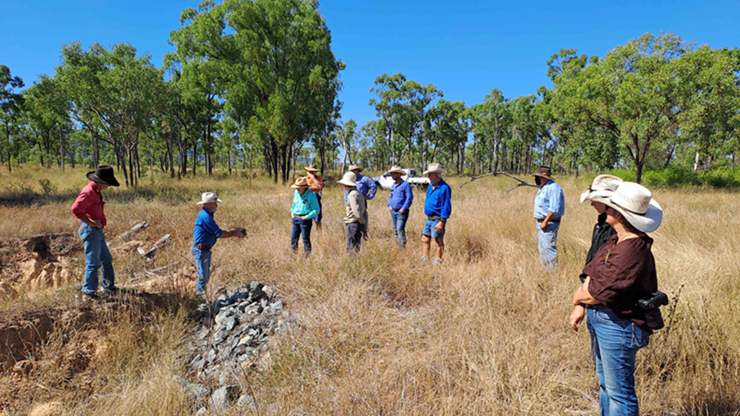 Image from the Hellsgate field walk, part of the 'Demonstrating Productive, Regenerative Burdekin Grazing Practices' PDS, delivered by NQ Dry Tropics.
Image from the Hellsgate field walk, part of the 'Demonstrating Productive, Regenerative Burdekin Grazing Practices' PDS, delivered by NQ Dry Tropics.
Four ways producer groups can prepare for the PDS open call
Key points
- The MLA Producer Demonstration Site (PDS) program – which provides support for producer-led groups to pursue new skills and implement new management practices.
- The annual call for Producer Demonstration Sites opens on 1 April.
- Register for the PDS webinar on the 26 March to learn more about the program and how to apply.
Profit-boosting research
The MLA Producer Demonstration Site (PDS) program – which provides support for producer-led groups to pursue new skills and implement new management practices – has delivered $1229.7 million in total net benefits to participating producers as a result of completed projects between 2015–2023. MLA’s investment in PDS since 2015 has delivered $14.2M in annual net benefits to producers in 2023–24.
On average, this means producers can expect an additional net benefit of $2.29 to $5.89/ha annually as a result of their participation in the program.
With the annual call for Producer Demonstration Site projects opening on 1 April, we speak to MLA Project Manager, Alana McEwan, about her top tips for preparing a high-quality application.
“Producers and farming organisations should always strive to be proactive in adopting effective management techniques and improving their business practices,” Alana said.
Before proceeding with a preliminary PDS application, applicants should:
1. Register for the MLA Producer Demonstration Site webinar
Alana McEwan alongside PDS Coordinators, Russell Pattinson and Maria Thompson, will provide an overview of MLA’s Producer Demonstration Site (PDS) program and how to set yourself up for success in the upcoming PDS call.
This webinar will cover:
- An overview of the PDS program.
- Different funding opportunities.
- What is involved in running a PDS project?
- Putting together a quality proposal.
- What resources are available?
- Hear from current PDS participants on the value and benefit they see from the projects they are involved in.
- Key dates for the 2025–26 PDS open call.
Register here for the PDS webinar on Wednesday 26 March at 12pm AEST.
2. Get buy-in from the producer group – ensure you’re engaging active producers who are open to practice change
MLA recommends establishing a group of 10 core producers, with three to five of them open to providing their properties to host demonstration sites. Producers should speak to peers in their local areas and start discussions on specific farming issues they think should be addressed.
Local service providers, such as farming systems groups, livestock advisors and consultants, can also provide great assistance by directing you towards like-minded producers, and providing support for group discussions.
3. Identify key management practices that are of interest and relevance to the group
Once your group has been established, identify the key management issues or opportunities that you want the project to address. These improvements can range from productivity increases, profitability maximisation or a change in perspective on sustainability.
4. Engage a PDS facilitator to assist with the application and project coordination
While PDSs are focused on producers working together and learning from each other, an experienced PDS facilitator is vital to the effective coordination of your project.
Although established farming systems groups often have staff members that take on this role, newer groups should consider outsourcing the technical knowledge and skills needed to deliver results to local service providers.. These include livestock advisors/consultants (both private and national, such as Elders/Nutrien), agronomists, vets and department extension officers. These providers can aid in the application process, communication with MLA’s PDS contacts and help keep the project on track for success.
The application process
The annual PDS call opens on 1 April, with preliminary applications closing on 12 May.
Successful preliminary applications will be invited to submit full applications, with successful full applications progressing to finalised contracts. This process takes approximately six months, with MLA seeking projects that will commence in the latter half of 2025–26. Projects must be active for a minimum of two years and a maximum of six years, allowing for continuous monitoring, adjustment and time for the practices to show their merit over various seasons.




